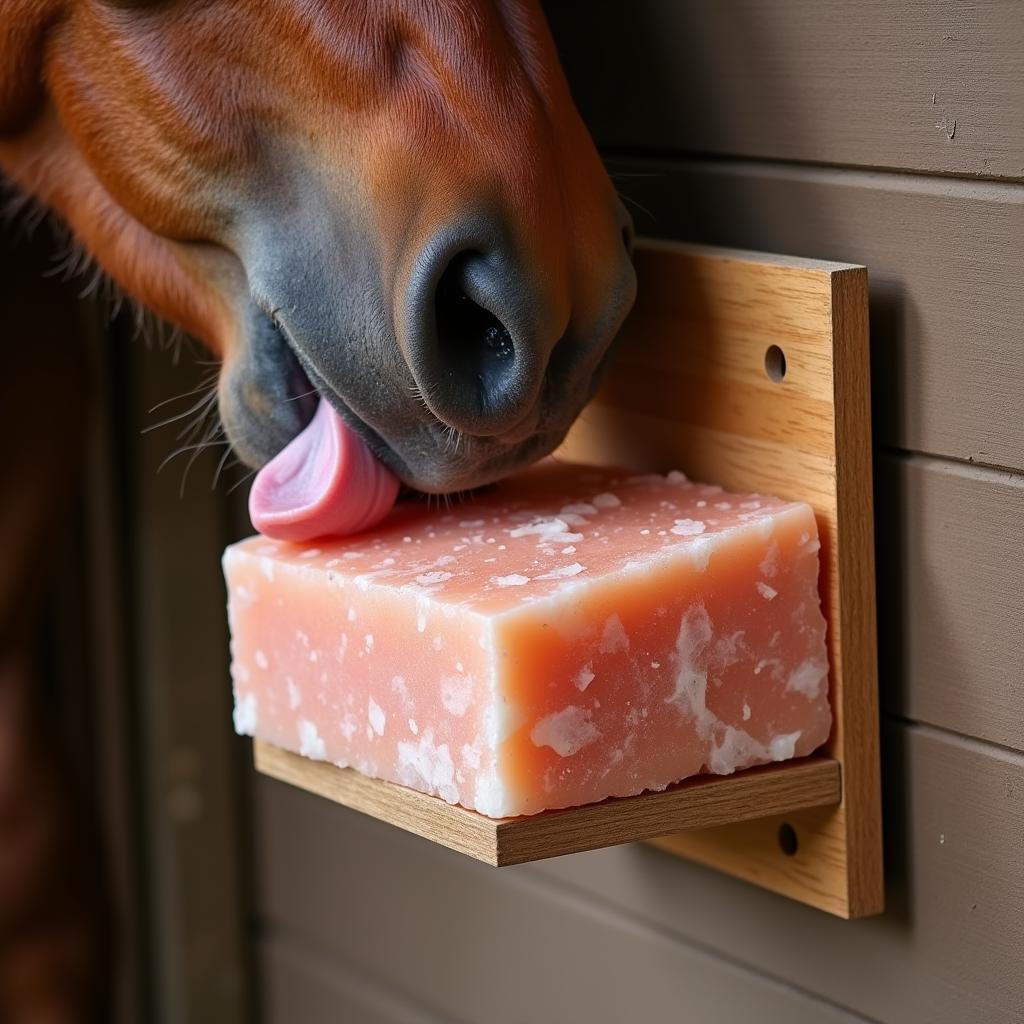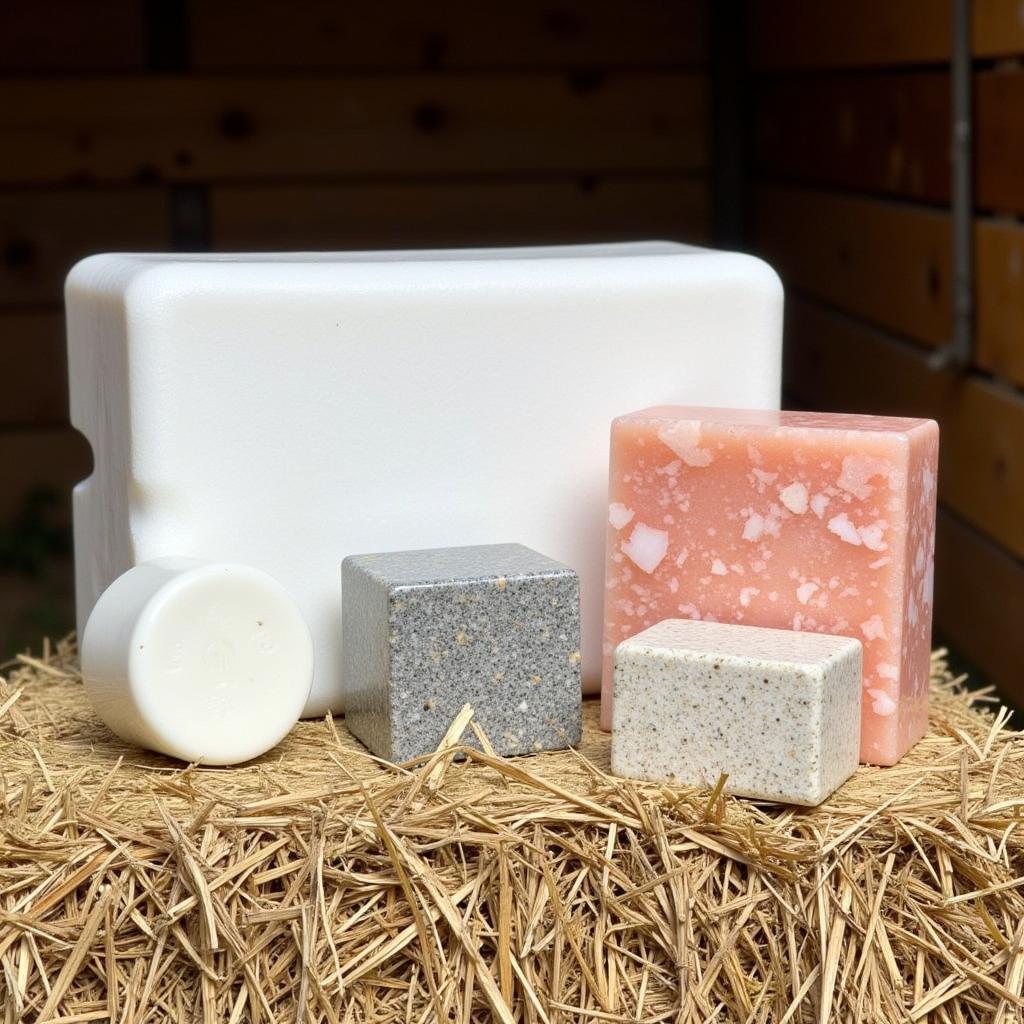Horse Blocks are essential for equine health and management, playing various crucial roles in a horse’s well-being. From providing essential minerals to aiding in mounting and enriching their environment, understanding the different types of horse blocks and their uses is vital for every horse owner. This article dives deep into the world of horse blocks, exploring their benefits, different types, and how to choose the right one for your horse.
The Importance of Horse Blocks in Equine Health
Horses require specific nutrients to maintain their health, and horse blocks can play a significant role in fulfilling these dietary needs. They offer a convenient way to supplement essential minerals like salt and other trace elements that might be lacking in their regular feed. horse salt blocks are especially crucial for maintaining proper hydration and electrolyte balance, which are essential for muscle function, nerve transmission, and overall health. Beyond nutritional benefits, certain types of horse blocks contribute to horse management, making them valuable tools for horse owners.
 Horse Consuming a Salt Block
Horse Consuming a Salt Block
Different Types of Horse Blocks and Their Uses
Horse blocks come in various forms, each serving a specific purpose. Understanding the differences will help you select the right block to meet your horse’s individual needs.
Mineral Blocks: A Nutritional Powerhouse
Mineral blocks provide a concentrated source of essential minerals and trace elements vital for equine health. These blocks are typically made of compressed minerals and can be offered free-choice, allowing horses to regulate their intake according to their needs. Common minerals found in these blocks include salt, calcium, phosphorus, magnesium, and zinc.
Salt Blocks: Hydration and Electrolyte Balance
Salt is a crucial mineral for horses, especially in warmer climates or during periods of intense exercise. horse salt blocks help replenish electrolytes lost through sweat, ensuring proper hydration and muscle function. They come in different forms, including plain white salt blocks, Himalayan pink salt blocks, and trace mineral salt blocks.
Mounting Blocks: Safe and Easy Mounting
mounting block horses aren’t about nutrition; they are about convenience and safety. These sturdy blocks provide a raised platform for mounting, reducing strain on both the horse and rider. They are particularly helpful for shorter riders or those with mobility issues.
 Rider Using a Mounting Block
Rider Using a Mounting Block
Choosing the Right Horse Block
Selecting the appropriate horse block depends on your horse’s individual needs and your specific management goals. Consider factors such as your horse’s diet, workload, and overall health.
Assessing Your Horse’s Needs
Before introducing any new supplement, consult with your veterinarian or equine nutritionist. They can help you determine any nutritional deficiencies your horse may have and recommend appropriate supplementation strategies.
Consider Your Horse’s Environment
The climate and environment where your horse lives can also influence block selection. For instance, horses in hot, humid environments may require more access to salt blocks.
Quality and Safety
Always choose high-quality horse blocks from reputable manufacturers to ensure they are free from harmful contaminants and provide the necessary nutrients.
Enhancing Horse Wellness with the Right Blocks
Horse blocks are valuable tools for supporting equine health and well-being. horse enrichment toys can also be considered in conjunction with appropriate blocks to further enhance a horse’s overall wellness. By understanding the different types of blocks and choosing the right ones for your horse, you can contribute to their optimal health, performance, and happiness.
 Different Types of Horse Blocks
Different Types of Horse Blocks
“Proper mineral supplementation is crucial for maintaining a horse’s health and performance,” explains Dr. Emily Carter, DVM, specializing in equine nutrition. “Horse blocks provide a convenient way to deliver these essential nutrients.”
Conclusion
Horse blocks are an essential aspect of horse care, offering various benefits from nutritional supplementation to mounting assistance. By understanding the different types and choosing wisely, you ensure your horse receives the specific support they need for a healthy, balanced life. Remember to consult with a veterinarian for personalized advice tailored to your horse’s specific needs and consider incorporating amino acid for horses for optimal health.
FAQs
- What are the different types of horse blocks?
- How can I determine which block is best for my horse?
- Are salt blocks necessary for all horses?
- How often should I replace horse blocks?
- Can horse blocks be used as a substitute for regular feed?
- What are the benefits of using a mounting block?
- How can I introduce a new block to my horse?
Common Scenarios and Questions
-
Scenario: My horse isn’t licking the salt block.
-
Question: What could be the reason, and how can I encourage my horse to use it?
-
Scenario: My horse is overweight.
-
Question: Which type of horse block would be suitable?
-
Scenario: My horse has specific dietary restrictions.
-
Question: How can I choose a block that meets their needs?
Further Reading and Resources
For more information on horse cells and their function, visit our article on horse cell.
If you need help choosing the right horse block, contact us for personalized advice.
Call us at: 0772127271
Email: [email protected]
Visit us at: QGM2+WX2, Vị Trung, Vị Thuỷ, Hậu Giang, Việt Nam. We have a 24/7 customer support team.